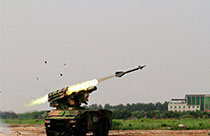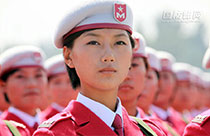


BEIJING, Aug. 31 -- China's upcoming military parade to celebrate the World War II (WWII) victory is an event that highlights the common aspiration of mankind, among them many Japanese: peace.
The parade will be held on Sept. 3 to commemorate the hard-won peace after years of bloody war that had inflicted heavy losses on China and other Asian countries.
China has never before held such an event after the end of WWII in 1945, while similar commemorative events were seen across Europe, which bore the impact of invasions by Nazi Germany during the war.
The Beijing parade will indeed bring to light China's contribution to the Allied victory that has previously been little known to people outside Asia and further obscured by time.
Former German Chancellor Gerhard Schroeder, who is among dozens of foreign statesmen invited to witness the military parade, said that when people in Europe talk about WWII, the main focus is usually on their own continent. Few people there know specifics about how WWII also raged in Asia and how fascism also brought terrible suffering to the Asian people.
However, commemoration is not the sole reason for the event that will also feature foreign troops from 17 countries in the parade, and will be joined by 30 national leaders and UN Secretary-General Ban Ki-moon.
The parade will also demonstrate China's aspiration for peace and its determination to safeguard post-war international order in honoring all the Chinese who perished in the war and those who have contributed to the victory in the deadly conflicts with Japan.
Peace after all the chaos and turbulence of war has been particularly treasured by the people in China and other Asian countries. Peace has enabled them to get on their feet and resume normal lives free from fear and hatred.
The military parade is by no means designed to "fan a smoldering antipathy" against Japan as touted by certain Western media, which have often misinterpreted the upcoming event.
Instead, the military parade's aim is to "remember history, cherish the memory of China's revolutionary martyrs, uphold peace and create the future," Zhang Ming, vice minister of China's Ministry of Foreign Affairs, told a press conference Tuesday.
"The celebrations are not targeting Japan, nor the Japanese people," Zhang said.
No one in their right mind is a fan of confrontations, and China has always hoped for friendly relations with its neighbor Japan, expecting Japan to deeply reflect on its wartime past.
However, the attitude of the Japanese rightist government is regrettable, and the recent moves by Prime Minister Shinzo Abe's administration to change the country's constitution to allow Japan's military a greater role have infuriated people in east Asia.
Tokyo in recent days has seen massive demonstrations against Abe, demanding the government rescind the controversial security bills.
Some 120,000 people, including many political heavyweights, rallied and surrounded Japan's parliament building on Sunday to oppose the bills.
The war has inflicted suffering not only on the Chinese people, but also on the Japanese people, and the profoundness of their bitterness could be seen at their commemorative events in Hiroshima and Nagasaki.
Most citizens in Japan want no more war, and the Japanese government should listen to its people to better serve their interests and ensure lasting peace in the Asia-Pacific region.
 'Enemy planes' intercepted by Hongqi-7B air-defense missiles
'Enemy planes' intercepted by Hongqi-7B air-defense missiles Blind date with bikini girls in Nanjing
Blind date with bikini girls in Nanjing Amazing photos of Chinese fighter jets
Amazing photos of Chinese fighter jets Chinese soldiers participate in training for V-Day parade
Chinese soldiers participate in training for V-Day parade Painting: Lonely women in Forbidden City
Painting: Lonely women in Forbidden City China and Russia hold joint drill in Sea of Japan
China and Russia hold joint drill in Sea of Japan 'Goddess' in Taiwan McDonald's
'Goddess' in Taiwan McDonald's Female soldiers at military parades
Female soldiers at military parades Photos of campus belle doing splits go viral
Photos of campus belle doing splits go viral Hands up, Pyongyang
Hands up, Pyongyang Last of the 'comfort women'
Last of the 'comfort women' Thai police nab suspect, find bogus Turkish ID
Thai police nab suspect, find bogus Turkish ID Snubbing parade embarrasses Tokyo itself
Snubbing parade embarrasses Tokyo itselfDay|Week